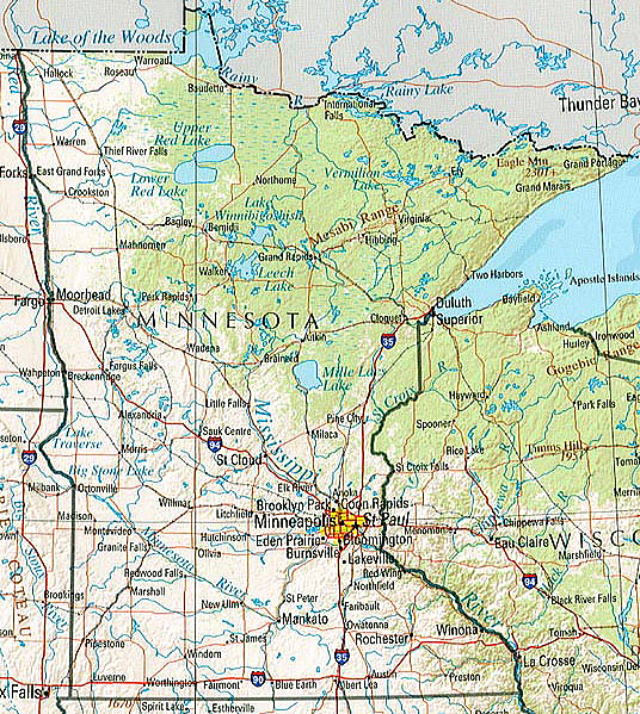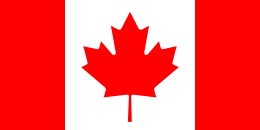'The Land of 10,000 Lakes', Minnesota
 
(L) Palisade Head on Lake Superior (R) The aerial lift bridge at Duluth,
a port town of Lake Superior
Minnesota is a state in the Midwestern region of the United States.The
state population is estimated
as 5.2 million. Nearly sixty percent of residents live in the Minneapolis-Saint
Paul Metropolitan area,
known as 'Twin Cities', which is the center of transportation, business,
industry and education.
  
(L) The IDS Tower, the tallest building, reflecting Wells Fargo Center,
Minneapolis
(M) A public transit vehicle in Minneapolis, Minnesota (R) Minneapolis
Institute of Arts
The state is known for its moderate to progressive politics and social policies, civic involvement, and high
voter turnout. Minnesota is ranking among the healthiest states, and has
a highly literate population.
Minnesotans have the nation's lowest premature death rate, third-lowest
infant mortality rate, and the
second-longest life expectancies. According to the U.S. Census Bureau, 91% of residents in Minnesota
are covered by their health insurance, more than in any other state. These
and other measures have led
two groups to rank Minnesota as the fourth healthiest state in the nation.
 
(L)The common Loon A distinctive cry is heard during the summer months
in the northern part of the Minnesota state.
(R) Phelps Mill in Otter Tail County, Minnesota
 
(L) Map of Minnesota's population change This map shows a steady increase
in population in the Minneapolis Metropolitan Area.
(R) Laurentian Mixed Forest, Minnesota
Medical care is provided by a comprehensive network of hospitals and clinics,
headed by two institutions
with international reputations. The University of Minnesota, School of
Medicine is a highly rated teaching
institution, that has made a number of breakthroughs in treatment, and
its research activities contribute
significantly to the state's growing biotechnology. Mayo Clinic, a world-renowned medical practice, is
based in Rochester.

Source: University of Texas Libraries
 Minnesota's new statewide smoking ban 2007 Minnesota's new statewide smoking ban 2007
Freedom to Breathe Act
The Freedom to Breathe Act of 2007 is a piece of Minnesota legislation
that restricts the act of smoking
tobacco products in public places. It amends sections of Minnesota Clean Indoor Air Act of 1975. This act
protects the public from the hazardous secondhand-smoke by banning smoking
in public places.
The need for policy change was fueled by facts of what secondhand smoke
does to the human body.
Secondhand-smoke, also referred to as environmental tobacco smoke, is a
complex mixture of chemicals
from gas exhaled by a smoker and from a lit tobacco product. Tobacco smoke
contains thousands of
chemicals, that include more than 50 known cancer causing agents, and include
200 poisons. Numerous
studies have confirmed that exposure to secondhand-smoke causes many serious illnesses in nonsmokers,
such as heart disease, respiratory problems, low birth weight, and sudden
infant death. Secondhand-
smoke is estimated to be responsible for 3,000 deaths from lung cancer
per annum among non-smokers
in the United States. Secondhand smoke also accounts for up to 62,000 heart disease related deaths
every year.
The Minnesota law applies to bars, restaurants, private clubs, lobbies
of hotels and motels, public trans-
portation, taxis, and smaller commercial vehicles carrying more than one
person. State law does not
address smoking outdoors,
but some local ordinances may prohibit smokingnear the entrances.
Smoking is permitted in the following places:
- A specified rooms in residential health care facilities.
- A separated, well-ventilated area of locked psychiatric units.
- Specified areas for use in peer-reviewed scientific studies related to
smoking.
- Private homes and residences when they are not in use as a place of employment.
- Hotel and motel guest rooms
- Tobacco-product shops for sampling products
- Heavy commercial vehicles
- Farm vehicles and construction equipment.
- Buildings on family farms
- A rest camp for disabled veterans
- Smoking is also permitted by Native Americans as part of a traditional
Native American
- spiritual or cultural ceremony and by actors as part of a theatrical performance.
Punishment for violations of the smoking ban is a petty misdemeanor with
fines up to $300. The owner of
a bar or restaurant could face a similar fine for violations, as well as
penalties up to the fine of $10,000.
Minnesota Department of Health
Source: Star Tribune, Minnesota, September 30, 2007 and others
アメリカ合衆国の中西部の州、ミネソタ、州都、セントポ−ル( St.Paul )市とミシシッピ川を挟んで隣接するミネア
ポリス( Minneapolis )市とを合わせて「Twin Cities 」と呼ばれている。名実共にミネソタ州の中心地である。
両市で約250万人の人口をもつ。州の北東部にはスペリオール湖があり、非常に美しい地域である。しかし、
冬の気温はマイナス20度を下回る日があり、「アメリカの冷蔵庫」との異名がある。大陸性の気候のため、夏は
必ずしも涼しいとも言えず、気温が30度を超える日も少なくない。筆者は車による米国・カナダ大陸従横断旅行の
途中、1962年7月に「Twin Cities」などを訪れている。
2007年10月、ミネソタ州でレストラン、バー、クラブ、ホテルやモーテルのロビー、公共交通機関、タクシーを
全面禁煙とする受動喫煙防止法を実施した。インデアンカジノ、ホテルおよびモーテルの喫煙客室、鍵のかかる精神
病棟はこの法令の適応外とした。ミネソタ州の喫煙規制法では屋外での喫煙規制は行わないが、地域の条例にて
出入口近辺での喫煙禁止を可とした。また地域の条例で禁止しない限り、レストランやバー屋外で喫煙する席を
設けることを認めた。法令違反の場合は罰金300ドルが科せられる。経営者には最高10,000ドルの罰金となる。
Total Smoking Ban in USA and Canada
 BC Canada BC Canada
 Alberta Alberta
 Saskatchewan Saskatchewan
 Manitoba Manitoba
 Ontario Ontario
 Quebec Quebec
 New Brunswick New Brunswick
 Nova Scotia Nova Scotia
 New Jersey New Jersey
 Illinois Illinois
 California California
 Beverly Hills Beverly Hills
 Condominium of California Condominium of California
 State of Washington State of Washington
 Oregon Oregon
 Montana Montana
 Colorado Colorado
 Arizona Arizona
 Maine Maine
 Vermont Vermont
 Massachusetts Massachusetts
 New York New York
 Maryland Maryland
 Washington,D.C. Washington,D.C.
 Virginia Virginia
 Minnesota Minnesota
 Delaware Delaware
 Ohio Ohio
 Iowa Iowa
 Utah Utah
 Rhode Island Rhode Island
 Nevada Nevada
 Michigan Michigan
 Wisconsin Wisconsin
 ミネソタ州 ミネソタ州
 2008年9月執筆 2009年11月英文加筆 医学博士 宮本順伯 2008年9月執筆 2009年11月英文加筆 医学博士 宮本順伯
★ This Web site is link-free.
The article was written in September 2008, by Junhaku Miyamoto, M.D., PhD.
Copyright (C) 2008 Junhaku Miyamoto, PhD. All right is reserved.
|
